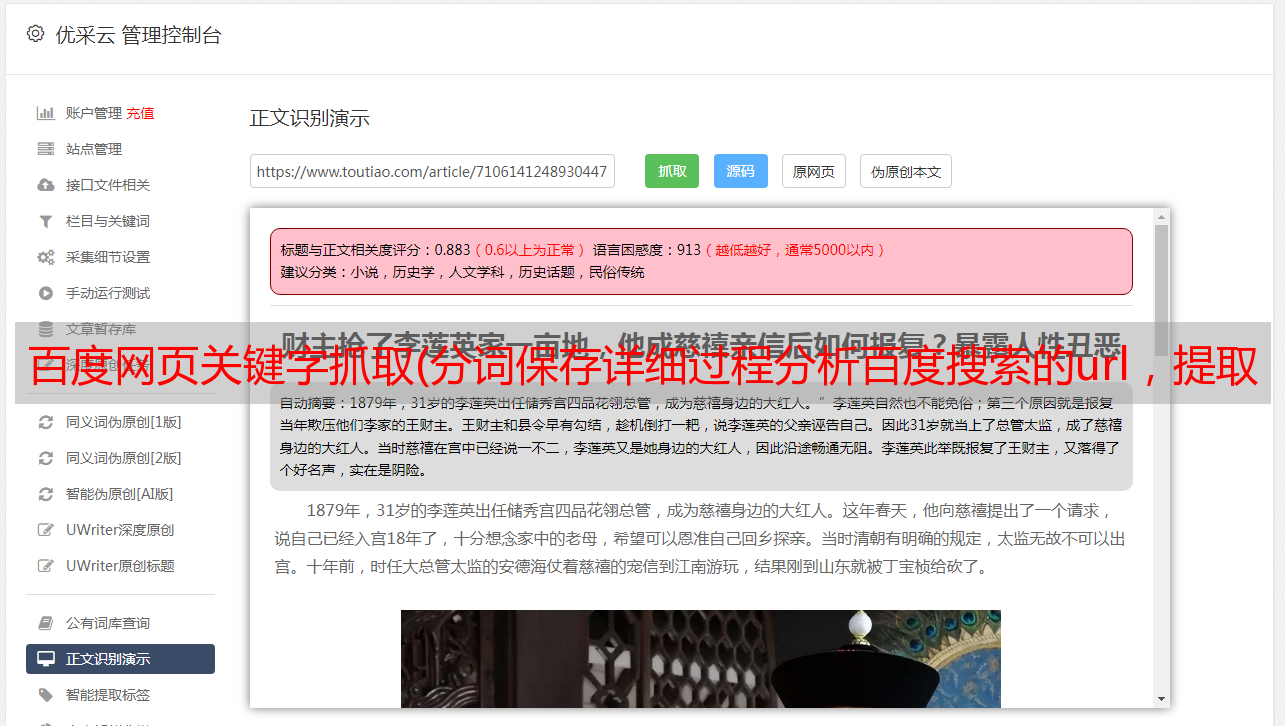百度网页关键字抓取(分词保存详细过程分析百度搜索的url,提取网页)
优采云 发布时间: 2021-09-09 20:05百度网页关键字抓取(分词保存详细过程分析百度搜索的url,提取网页)
本文是在网上学习了一些相关的博客和资料后的学习总结。是入门级爬虫
相关工具和环境
python3 及以上
网址库
美汤
jieba 分词
url2io(提取网页正文)
整体流程介绍
解析百度搜索的url,用urllib.request提取网页,用beausoup解析页面,分析搜索页面,找到搜索结果在页面中的结构位置,提取搜索结果,然后得到搜索结果真实url,提取网页正文,分词保存
详细流程1.解析百度搜索url获取页面
我们使用百度的时候,输入关键词,点击搜索,可以看到页面url有一大串字符。但是我们在使用爬虫获取页面的时候,并没有使用这样的字符。我们实际使用的 url 是这样的:#39; 关键词'&pn='页面'。 wd是你搜索的关键,pn是分页页,因为百度搜索每页有十个结果(最上面的可能是广告宣传,不是搜索结果),所以pn=0就是第一页,第二页就是pn=10,依此类推,你可以试试周杰伦&pn=20,得到的是关于周杰伦的搜索结果第三页。
word = '周杰伦'
url = 'http://www.baidu.com.cn/s?wd=' + urllib.parse.quote(word) + '&pn=0' # word为关键词,pn是百度用来分页的..
response = urllib.request.urlopen(url)
page = response.read()
上面这句话是一个简单的爬虫,得到百度搜索结果的页面,这个词是通过关键词传递的,如果收录中文,需要使用urllib.parse.quote来防止出错,因为超链接默认为ascii编码,不能直接出现中文。
2.分析页面的html结构,找到搜索链接在页面中的位置,得到真正的搜索链接
使用谷歌浏览器的开发者模式(F12或Fn+F12),点击左上角箭头,点击搜索结果之一,如下图,可以看到搜索到结果都在class="result c-container"的div中,每个div都收录class="t"的h3标签,h3标签收录a标签,搜索结果在href注释中。
知道url的位置很方便,我们使用beautifulsoup使用lxml解析页面(pip install beautifulsoup4,pip install lxml,如果pip安装出错,网上搜索相关安装教程)
headers = {
'Accept': 'text/html,application/xhtml+xml,application/xml;q=0.9,*/*;q=0.8',
'Accept-Encoding': 'gzip, deflate, compress',
'Accept-Language': 'en-us;q=0.5,en;q=0.3',
'Cache-Control': 'max-age=0',
'Connection': 'keep-alive',
'User-Agent': 'Mozilla/5.0 (X11; Ubuntu; Linux x86_64; rv:22.0) Gecko/20100101 Firefox/22.0'
} #定义头文件,伪装成浏览器
all = open('D:\\111\\test.txt', 'a')
soup = BeautifulSoup(page, 'lxml')
tagh3 = soup.find_all('h3')
for h3 in tagh3:
href = h3.find('a').get('href')
baidu_url = requests.get(url=href, headers=headers, allow_redirects=False)
real_url = baidu_url.headers['Location'] #得到网页原始地址
if real_url.startswith('http'):
all.write(real_url + '\n')
因为页面除了搜索结果不收录其他h3标签,所以我们直接使用beautifulsoup获取所有h3标签,然后使用for循环获取每个搜索结果的url。
上面的请求也是爬虫包。在没有安装 huapip 的情况下安装它。我们可以使用这个包的get方法来获取相关页面的头文件信息。里面的Location对应的是网页的真实url。我们定期过滤掉一些无用的网址并保存。
注意有时伪装的头文件Accept-Encoding会导致乱码,可以删除。
3. 提取网页正文并进行分词
api = url2io.API('bjb4w0WATrG7Lt6PVx_TrQ')
try:
ret = api.article(url=url,fields=['text', 'next'])
text = ret['text']
except:
return
我们可以用网上的第三方包url2io提取网页的body和url。但请注意,此包基于 pyhton2.7。其中使用的urllib2在python3版本中已经合并到urllib中。您需要自己修改它。 pyhton3中的basestring也删掉了改成str就够了,这个包可以提取大部分收录文本的网页,不能提取的情况用try语句处理。
我们使用 jieba 对提取的文本进行分割。 jieba的使用:点击打开链接。
# -*- coding:utf-8 -*-
import jieba
import jieba.posseg as pseg
import url2io
from pymongo import MongoClient
conn = MongoClient('localhost', 27017)
db = conn.test
count = db.count
count.remove()
def test():
filename = 'C:\\xxx\\include.txt'
jieba.load_userdict(filename)
seg_list = jieba.cut("我家住在青山区博雅豪庭大华南湖公园世家五栋十三号") #默认是精确模式
print(", ".join(seg_list))
fff = "我家住在青山区博雅豪庭大.华南湖公园世家啊说,法撒撒打算武汉工商学院五栋十三号"
result = pseg.cut(fff)
for w in result:
print(w.word, '/', w.flag, ',')
def get_address(url):
api = url2io.API('bjb4w0WATrG7Lt6PVx_TrQ')
try:
ret = api.article(url=url,fields=['text', 'next'])
text = ret['text']
filename = 'C:\\xxx\\include.txt'
jieba.load_userdict(filename)
result = pseg.cut(text)
for w in result:
if(w.flag=='wh'):
print(w.word)
res = count.find_one({"name": w.word})
if res:
count.update_one({"name": w.word},{"$set": {"sum": res['sum']+1}})
else:
count.insert({"name": w.word,"sum": 1})
except:
return
我结合使用自定义词典进行分词。
4.使用多进程(POOL进程池)提高爬行速度
为什么不使用多线程,因为python的多线程太鸡肋了,详细资料点百度就知道了。下面我就直接把代码全部放出来,有一种方法可以把地址保存在txt文件和MongoDB数据库中。
百度.py
# -*- coding:utf-8 -*-
'''
从百度把前10页的搜索到的url爬取保存
'''
import multiprocessing #利用pool进程池实现多进程并行
# from threading import Thread 多线程
import time
from bs4 import BeautifulSoup #处理抓到的页面
import sys
import requests
import importlib
importlib.reload(sys)#编码转换,python3默认utf-8,一般不用加
from urllib import request
import urllib
from pymongo import MongoClient
conn = MongoClient('localhost', 27017)
db = conn.test#数据库名
urls = db.cache#表名
urls.remove()
'''
all = open('D:\\111\\test.txt', 'a')
all.seek(0) #文件标记到初始位置
all.truncate() #清空文件
'''
headers = {
'Accept': 'text/html,application/xhtml+xml,application/xml;q=0.9,*/*;q=0.8',
'Accept-Encoding': 'gzip, deflate, compress',
'Accept-Language': 'en-us;q=0.5,en;q=0.3',
'Cache-Control': 'max-age=0',
'Connection': 'keep-alive',
'User-Agent': 'Mozilla/5.0 (X11; Ubuntu; Linux x86_64; rv:22.0) Gecko/20100101 Firefox/22.0'
} #定义头文件,伪装成浏览器
def getfromBaidu(word):
start = time.clock()
url = 'http://www.baidu.com.cn/s?wd=' + urllib.parse.quote(word) + '&pn=' # word为关键词,pn是百度用来分页的..
pool = multiprocessing.Pool(multiprocessing.cpu_count())
for k in range(1, 5):
result = pool.apply_async(geturl, (url, k))# 多进程
pool.close()
pool.join()
end = time.clock()
print(end-start)
def geturl(url, k):
path = url + str((k - 1) * 10)
response = request.urlopen(path)
page = response.read()
soup = BeautifulSoup(page, 'lxml')
tagh3 = soup.find_all('h3')
for h3 in tagh3:
href = h3.find('a').get('href')
# print(href)
baidu_url = requests.get(url=href, headers=headers, allow_redirects=False)
real_url = baidu_url.headers['Location'] #得到网页原始地址
if real_url.startswith('http'):
urls.insert({"url": real_url})
# all.write(real_url + '\n')
if __name__ == '__main__':
getfromBaidu('周杰伦')
pool = multiprocessing.Pool(multiprocessing.cpu_count())
根据cpu的核数确认进程池中的进程数。多进程和POOL的使用详情请点击打开链接
修改后的url2io.py
<p>#coding: utf-8
#
# This program is free software. It comes without any warranty, to
# the extent permitted by applicable law. You can redistribute it
# and/or modify it under the terms of the Do What The Fuck You Want
# To Public License, Version 2, as published by Sam Hocevar. See
# http://sam.zoy.org/wtfpl/COPYING (copied as below) for more details.
#
# DO WHAT THE FUCK YOU WANT TO PUBLIC LICENSE
# Version 2, December 2004
#
# Copyright (C) 2004 Sam Hocevar
#
# Everyone is permitted to copy and distribute verbatim or modified
# copies of this license document, and changing it is allowed as long
# as the name is changed.
#
# DO WHAT THE FUCK YOU WANT TO PUBLIC LICENSE
# TERMS AND CONDITIONS FOR COPYING, DISTRIBUTION AND MODIFICATION
#
# 0. You just DO WHAT THE FUCK YOU WANT TO.
"""a simple url2io sdk
example:
api = API(token)
api.article(url='http://www.url2io.com/products', fields=['next', 'text'])
"""
__all__ = ['APIError', 'API']
DEBUG_LEVEL = 1
import sys
import socket
import json
import urllib
from urllib import request
import time
from collections import Iterable
import importlib
importlib.reload(sys)
headers = {
'Accept': 'text/html,application/xhtml+xml,application/xml;q=0.9,*/*;q=0.8',
'Cache-Control': 'max-age=0',
'Connection': 'keep-alive',
'User-Agent': 'Mozilla/5.0 (X11; Ubuntu; Linux x86_64; rv:22.0) Gecko/20100101 Firefox/22.0'
} #定义头文件,伪装成浏览器
class APIError(Exception):
code = None
"""HTTP status code"""
url = None
"""request URL"""
body = None
"""server response body; or detailed error information"""
def __init__(self, code, url, body):
self.code = code
self.url = url
self.body = body
def __str__(self):
return 'code={s.code}\nurl={s.url}\n{s.body}'.format(s = self)
__repr__ = __str__
class API(object):
token = None
server = 'http://api.url2io.com/'
decode_result = True
timeout = None
max_retries = None
retry_delay = None
def __init__(self, token, srv = None,
decode_result = True, timeout = 30, max_retries = 5,
retry_delay = 3):
""":param srv: The API server address
:param decode_result: whether to json_decode the result
:param timeout: HTTP request timeout in seconds
:param max_retries: maximal number of retries after catching URL error
or socket error
:param retry_delay: time to sleep before retrying"""
self.token = token
if srv:
self.server = srv
self.decode_result = decode_result
assert timeout >= 0 or timeout is None
assert max_retries >= 0
self.timeout = timeout
self.max_retries = max_retries
self.retry_delay = retry_delay
_setup_apiobj(self, self, [])
def update_request(self, request):
"""overwrite this function to update the request before sending it to
server"""
pass
def _setup_apiobj(self, apiobj, path):
if self is not apiobj:
self._api = apiobj
self._urlbase = apiobj.server + '/'.join(path)
lvl = len(path)
done = set()
for i in _APIS:
if len(i)



